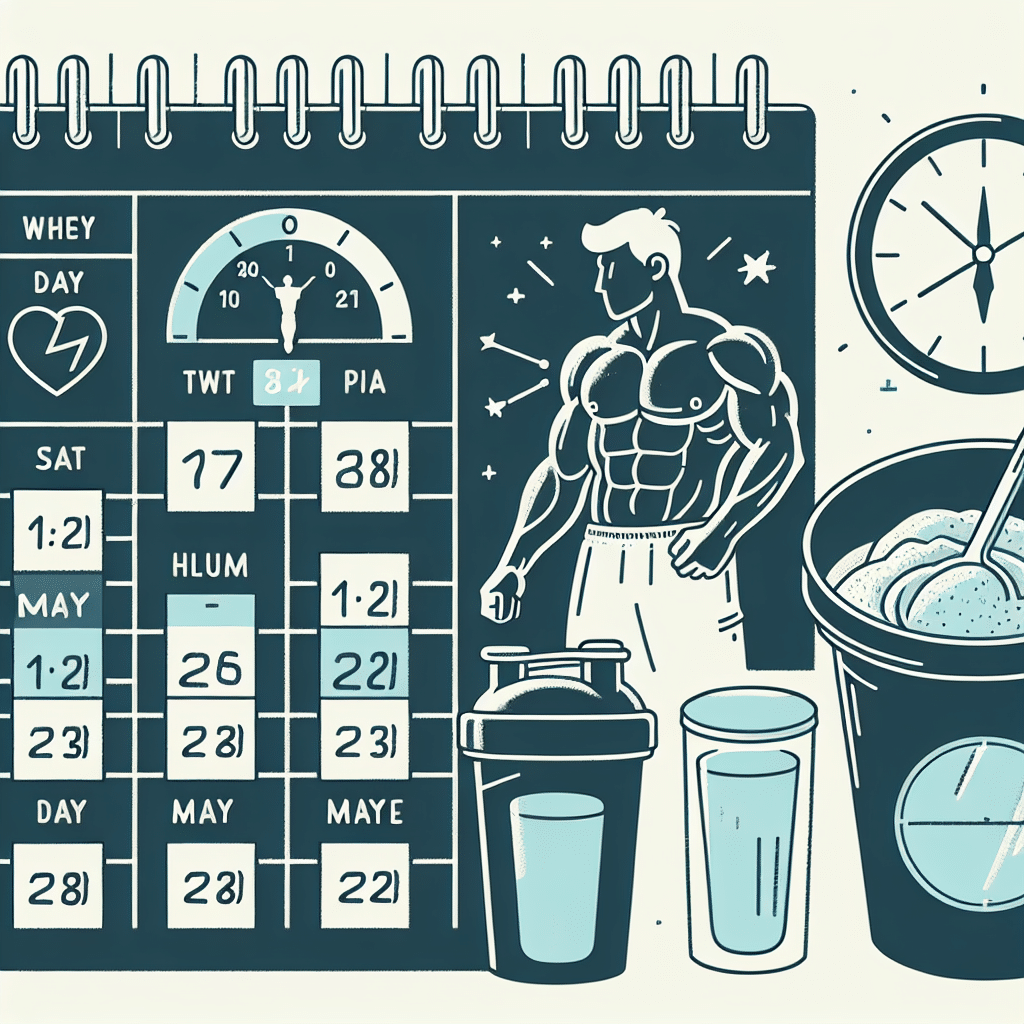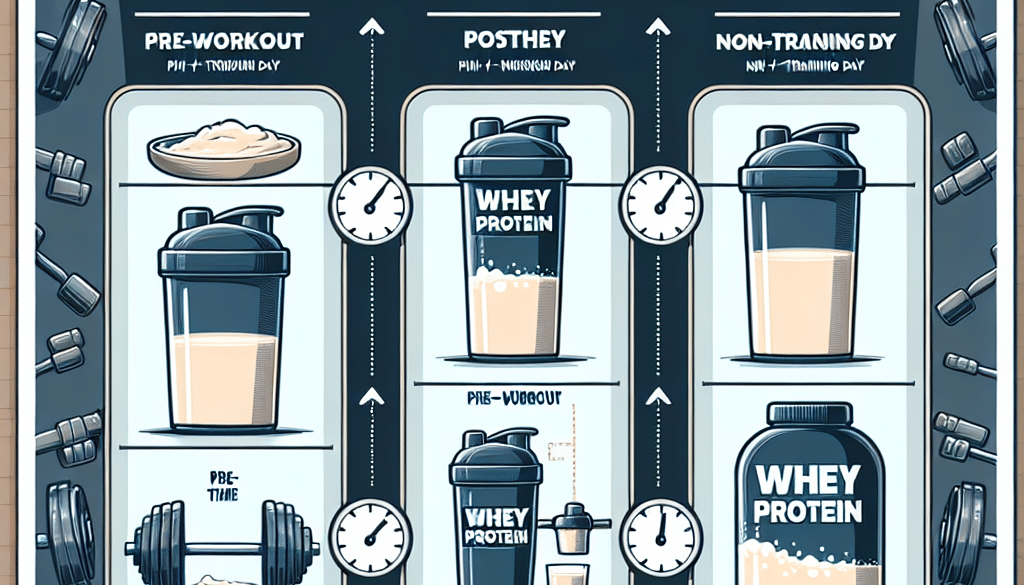When Should I Take Whey Protein?
-
Table of Contents
- Whey Protein Timing: Maximizing Muscle Growth and Recovery
- Understanding Whey Protein
- The Best Times to Take Whey Protein
- Post-Workout: The Anabolic Window
- Pre-Workout: Fueling Muscle Preservation
- Between Meals: Sustaining Amino Acid Levels
- Before Bed: Overnight Muscle Repair
- Factors Influencing Whey Protein Timing
- Conclusion: Personalizing Your Protein Timing
- Discover ETprotein’s Premium Protein Products
Whey Protein Timing: Maximizing Muscle Growth and Recovery

Whey protein is a staple supplement in the fitness world, renowned for its high-quality protein content and rapid absorption rate. It’s a go-to for athletes, bodybuilders, and fitness enthusiasts looking to enhance muscle growth, recovery, and overall health. However, the question often arises: when is the best time to take whey protein? This article delves into the science behind whey protein timing to help you make the most of this powerful supplement.
Understanding Whey Protein
Before we explore the optimal timing for whey protein consumption, it’s important to understand what whey protein is and how it benefits the body. Whey protein is derived from milk during the cheese-making process and is a complete protein, meaning it contains all nine essential amino acids necessary for muscle repair and growth. It’s also rich in branched-chain amino acids (BCAAs), particularly leucine, which plays a critical role in protein synthesis.
The Best Times to Take Whey Protein
There are several key times throughout the day when taking whey protein can be particularly beneficial for your body’s needs. Here’s a breakdown of when and why you should consider whey protein supplementation:
Post-Workout: The Anabolic Window
One of the most critical times to consume whey protein is immediately following a workout. During exercise, muscle fibers are damaged, and the body enters a catabolic state where it begins to break down muscle tissue for energy. Consuming whey protein post-workout provides the body with the necessary amino acids to shift from a catabolic state to an anabolic one, promoting muscle repair and growth.
- Speed of Absorption: Whey protein is absorbed quickly, making it ideal for post-workout recovery when your muscles are primed to utilize available nutrients.
- Enhanced Recovery: Studies have shown that consuming protein after exercise can significantly improve muscle recovery and reduce soreness.
Pre-Workout: Fueling Muscle Preservation
Taking whey protein before a workout can also be beneficial. It ensures a steady supply of amino acids throughout your training session, which can help prevent muscle breakdown and provide additional energy.
- Prevention of Muscle Catabolism: A pre-workout protein shake can help protect your muscles against catabolism during intense training.
- Improved Performance: Some evidence suggests that pre-workout protein intake may enhance athletic performance, although more research is needed in this area.
Between Meals: Sustaining Amino Acid Levels
Consuming whey protein between meals can help maintain a positive nitrogen balance, which is essential for muscle growth. It can also help control hunger and prevent overeating at meal times.
- Appetite Control: Protein is satiating, which can help you feel fuller for longer and reduce the likelihood of snacking on less nutritious options.
- Steady Nutrient Supply: Regular protein intake throughout the day ensures that your muscles have a constant supply of the amino acids they need to repair and grow.
Before Bed: Overnight Muscle Repair
While whey protein is fast-absorbing, taking it before bed can provide your body with the necessary nutrients to repair and build muscle overnight. This is especially useful for those looking to maximize muscle growth or for athletes undergoing intense training regimens.
- Continuous Muscle Repair: Your body repairs itself during sleep, and providing it with protein can enhance this natural process.
- Reduced Muscle Breakdown: A protein shake before bed can help reduce the rate of muscle protein breakdown that occurs during the night due to fasting.
Factors Influencing Whey Protein Timing
While the above guidelines provide a general framework for whey protein timing, individual factors can influence the optimal time for consumption. These include:
- Dietary Habits: Your overall diet and meal frequency can affect when you should take whey protein. If you already consume a protein-rich meal shortly after your workout, you may not need an immediate protein shake.
- Training Intensity: The intensity and duration of your workouts can impact your protein needs. More intense training may require quicker replenishment of amino acids.
- Personal Goals: Whether you’re aiming for muscle gain, weight loss, or improved athletic performance, your objectives will dictate your protein timing and quantity.
Conclusion: Personalizing Your Protein Timing
In conclusion, while there are optimal times to take whey protein, the most important factor is your overall protein intake throughout the day. Post-workout, pre-workout, between meals, and before bed are all strategic times to consume whey protein to support muscle growth and recovery. However, individual needs and goals should always be considered when determining the best timing for you.
Discover ETprotein’s Premium Protein Products
If you’re looking for high-quality whey protein to support your fitness journey, consider ETprotein’s range of protein products. ETprotein is a trusted manufacturer and supplier of organic bulk vegan proteins and L-(+)-Ergothioneine (EGT), offering a variety of protein options to suit your needs. Their products are characterized by a neutral taste, non-GMO, allergen-free attributes, and high purity levels, making them an excellent choice for anyone looking to enhance their protein intake.
About ETprotein:
ETprotein, a reputable protein and L-(+)-Ergothioneine (EGT) Chinese factory manufacturer and supplier, is renowned for producing, stocking, exporting, and delivering the highest quality organic bulk vegan proteins and L-(+)-Ergothioneine. They include Organic rice protein, clear rice protein, pea protein, clear pea protein, watermelon seed protein, pumpkin seed protein, sunflower seed protein, mung bean protein, peanut protein, and L-(+)-Ergothioneine EGT Pharmaceutical grade, L-(+)-Ergothioneine EGT food grade, L-(+)-Ergothioneine EGT cosmetic grade, L-(+)-Ergothioneine EGT reference grade and L-(+)-Ergothioneine EGT standard. Their offerings, characterized by a neutral taste, non-GMO, allergen-free attributes, with L-(+)-Ergothioneine purity over 98%, 99%, cater to a diverse range of industries. They serve nutraceutical, pharmaceutical, cosmeceutical, veterinary, as well as food and beverage finished product distributors, traders, and manufacturers across Europe, USA, Canada, Australia, Thailand, Japan, Korea, Brazil, and Chile, among others.
ETprotein specialization includes exporting and delivering tailor-made protein powder and finished nutritional supplements. Their extensive product range covers sectors like Food and Beverage, Sports Nutrition, Weight Management, Dietary Supplements, Health and Wellness Products, and Infant Formula, ensuring comprehensive solutions to meet all your protein needs.
As a trusted company by leading global food and beverage brands and Fortune 500 companies, ETprotein reinforces China’s reputation in the global arena. For more information or to sample their products, please contact them and email sales(at)ETprotein.com today.












